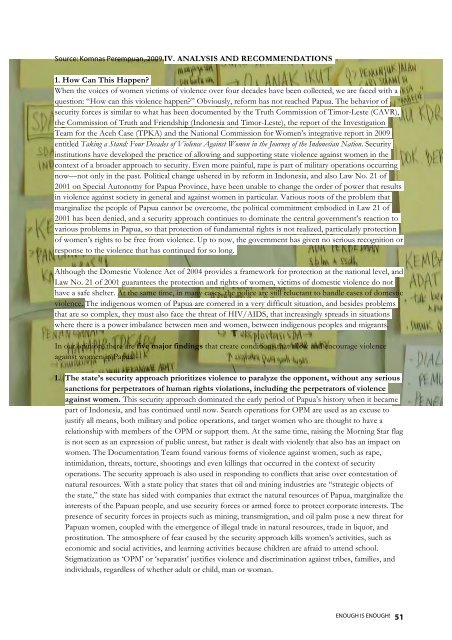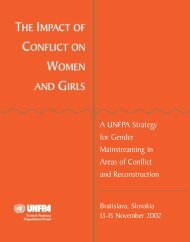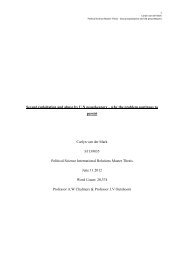Stop Sudah English-revised-March2012 - International Center for ...
Stop Sudah English-revised-March2012 - International Center for ...
Stop Sudah English-revised-March2012 - International Center for ...
You also want an ePaper? Increase the reach of your titles
YUMPU automatically turns print PDFs into web optimized ePapers that Google loves.
Source: Komnas Perempuan, 2009.IV. ANALYSIS AND RECOMMENDATIONS<br />
1. How Can This Happen?<br />
When the voices of women victims of violence over four decades have been collected, we are faced with a<br />
question: “How can this violence happen?” Obviously, re<strong>for</strong>m has not reached Papua. The behavior of<br />
security <strong>for</strong>ces is similar to what has been documented by the Truth Commission of Timor-Leste (CAVR),<br />
the Commission of Truth and Friendship (Indonesia and Timor-Leste), the report of the Investigation<br />
Team <strong>for</strong> the Aceh Case (TPKA) and the National Commission <strong>for</strong> Women’s integrative report in 2009<br />
entitled Taking a Stand: Four Decades of Violence Against Women in the Journey of the Indonesian Nation. Security<br />
institutions have developed the practice of allowing and supporting state violence against women in the<br />
context of a broader approach to security. Even more painful, rape is part of military operations occurring<br />
now—not only in the past. Political change ushered in by re<strong>for</strong>m in Indonesia, and also Law No. 21 of<br />
2001 on Special Autonomy <strong>for</strong> Papua Province, have been unable to change the order of power that results<br />
in violence against society in general and against women in particular. Various roots of the problem that<br />
marginalize the people of Papua cannot be overcome, the political commitment embodied in Law 21 of<br />
2001 has been denied, and a security approach continues to dominate the central government’s reaction to<br />
various problems in Papua, so that protection of fundamental rights is not realized, particularly protection<br />
of women’s rights to be free from violence. Up to now, the government has given no serious recognition or<br />
response to the violence that has continued <strong>for</strong> so long.<br />
Although the Domestic Violence Act of 2004 provides a framework <strong>for</strong> protection at the national level, and<br />
Law No. 21 of 2001 guarantees the protection and rights of women, victims of domestic violence do not<br />
have a safe shelter. At the same time, in many cases, the police are still reluctant to handle cases of domestic<br />
violence. The indigenous women of Papua are cornered in a very difficult situation, and besides problems<br />
that are so complex, they must also face the threat of HIV/AIDS, that increasingly spreads in situations<br />
where there is a power imbalance between men and women, between indigenous peoples and migrants.<br />
In our opinion, there are five major findings that create conditions that allow and encourage violence<br />
against women in Papua.<br />
1. The state’s security approach prioritizes violence to paralyze the opponent, without any serious<br />
sanctions <strong>for</strong> perpetrators of human rights violations, including the perpetrators of violence<br />
against women. This security approach dominated the early period of Papua’s history when it became<br />
part of Indonesia, and has continued until now. Search operations <strong>for</strong> OPM are used as an excuse to<br />
justify all means, both military and police operations, and target women who are thought to have a<br />
relationship with members of the OPM or support them. At the same time, raising the Morning Star flag<br />
is not seen as an expression of public unrest, but rather is dealt with violently that also has an impact on<br />
women. The Documentation Team found various <strong>for</strong>ms of violence against women, such as rape,<br />
intimidation, threats, torture, shootings and even killings that occurred in the context of security<br />
operations. The security approach is also used in responding to conflicts that arise over contestation of<br />
natural resources. With a state policy that states that oil and mining industries are “strategic objects of<br />
the state,” the state has sided with companies that extract the natural resources of Papua, marginalize the<br />
interests of the Papuan people, and use security <strong>for</strong>ces or armed <strong>for</strong>ce to protect corporate interests. The<br />
presence of security <strong>for</strong>ces in projects such as mining, transmigration, and oil palm pose a new threat <strong>for</strong><br />
Papuan women, coupled with the emergence of illegal trade in natural resources, trade in liquor, and<br />
prostitution. The atmosphere of fear caused by the security approach kills women’s activities, such as<br />
economic and social activities, and learning activities because children are afraid to attend school.<br />
Stigmatization as ‘OPM’ or ‘separatist’ justifies violence and discrimination against tribes, families, and<br />
individuals, regardless of whether adult or child, man or woman.<br />
ENOUGH IS ENOUGH! 51




![IANSA [PDF, 2MB] - PeaceWomen](https://img.yumpu.com/25206379/1/190x123/iansa-pdf-2mb-peacewomen.jpg?quality=85)
![Commitments Sample [PDF, 93KB] - PeaceWomen](https://img.yumpu.com/25206331/1/190x245/commitments-sample-pdf-93kb-peacewomen.jpg?quality=85)










![A Toolkit for Advocacy and Action [PDF, 260KB] - Peace Women](https://img.yumpu.com/25205989/1/190x245/a-toolkit-for-advocacy-and-action-pdf-260kb-peace-women.jpg?quality=85)